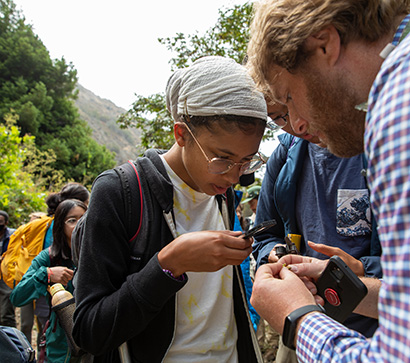Campus News
UCSC joins multi-institutional effort to advance equity and inclusion in science
The HHMI Inclusive Excellence Learning Community initiative is supporting efforts to redesign the introductory science curriculum.

UC Santa Cruz has a long history of innovative approaches to undergraduate education, and one focus in recent years has been to address issues of diversity, equity, and inclusion in the sciences.
In a new initiative funded by the Howard Hughes Medical Institute (HHMI), UCSC is working on these issues in collaboration with other institutions as part of the HHMI Inclusive Excellence 3 (IE3) Learning Community.
“UCSC is committed to increasing diversity and inclusion in the sciences, and HHMI has been supporting our efforts in this area for many years,” said UCSC Chancellor Cindy Larive. “We have an excellent team of science educators leading this new effort, and I am excited about their collaborative work with other institutions on these issues. Engaging people from different backgrounds is important for addressing inequities and increasing the scientifically trained workforce. It’s also crucial because it leads to better science.”
The initiative is focusing on the introductory science curriculum because much of the loss of diversity in the sciences occurs during this critical period of a student’s college experience.
“A significant fraction of the students who come to college with an authentic interest in science don’t make it all the way to earning a science degree, and those kids who are leaving science majors disproportionately come from groups that are underrepresented in STEM disciplines,” said Grant Hartzog, professor of molecular, cell, and developmental (MCD) biology and a member of UCSC’s IE3 Leadership Team.
Collaborative approach
In a departure from its traditional grantmaking, HHMI is taking a collaborative approach for this new inclusive excellence initiative. Each of 104 participating schools was awarded a small grant to support on-campus efforts, and the institutions are also working together in seven Learning Community Clusters.
UC Santa Cruz is one of 15 institutions in Cluster 1, which is focused on making the content of the introductory STEM curriculum more inclusive. The group has been meeting to share ideas and develop a proposal for projects to be funded through additional grants from HHMI.
“It’s an opportunity to share experiences and evaluate our efforts as part of a cohort of universities with a common set of values and goals,” Hartzog said.
At UCSC, the Department of Ecology and Evolutionary Biology (EEB) is using the initial $30,000 from HHMI to develop an introductory field course for biology students.
“We know that the sooner we get students involved in labs and field research, the better they do,” Hartzog said. “The traditional approach to biology education is two years of introductory lecture courses before they get to do the things they’re really interested in.”
EEB Professor Erika Zavaleta is coordinating the development of the one-quarter field course, to be offered in conjunction with the lecture-based biology core course in ecology and evolution. “We want to get students out in the field and have that be part of their experience right off the bat,” she said. “They’ll have a chance to work collaboratively in small groups on real research and build a sense of community with each other and with their instructors.”
Zavaleta said previous studies, such as a 2020 paper from her group, have demonstrated the value of field courses for boosting the retention and success of underrepresented students in science majors.
“UC Santa Cruz has strong roots in hands-on integrative learning within a community—that’s where the campus started—and I feel like we’re coming full circle, with a difference now that we are a Hispanic Serving Institution and almost half our students are first-generation,” she said. “It means going back to that high-quality experiential approach with even more of an eye to serving students with diverse experiences and perspectives. That’s what is really exciting.”
Active learning
Hartzog said UCSC’s biology departments (EEB and MCD Biology) have been working for several years in association with the Center for Innovations in Teaching and Learning (CITL) to revamp their introductory biology courses, developing active learning versions of the large courses. Active learning, which involves various ways of engaging students in “learning by doing” instead of listening passively to lectures, is a proven method for increasing student learning and retention in the sciences.
Robin Dunkin, an assistant teaching professor in EEB and assistant faculty director of CITL, said she sees the next phase as building on what has been learned from redesigning the introductory biology and chemistry courses.
“After several iterations of doing redesigns class by class, this is a chance to think broadly and holistically about our introductory curriculum as a whole,” Dunkin said. “We want to think about what that entire first-year experience is like, try to make movement through the curriculum smoother, and help students to see themselves as scientists and feel they belong here at the university and in the discipline.”
Ultimately, the goal is to improve graduation rates, admissions to graduate and professional schools, and other metrics for students in the sciences, especially those from traditionally underrepresented groups.
“UCSC is really ahead of the game—other universities are starting to do things that we’ve been doing for awhile,” Hartzog said. “Our campus’s superpower is CITL and the work that Robin Dunkin and CITL Director Jody Greene are doing. It makes me feel good about UCSC and the amount of groundwork we’ve already done.”
HHMI has helped fund many of these efforts, including the active learning initiative in the Division of Physical and Biological Sciences. Several biology faculty have received support for science education programs through the HHMI Professors Program, including Zavaleta, MCD Biology Professor Manuel Ares, and EEB Professor Beth Shapiro.
UCSC’s IE3 Leadership Team includes Hartzog, Zavaleta, and Dunkin, as well as Susanna Honig, director of the Academic Excellence (ACE) Program; Gage Dayton, director of the UCSC Natural Reserves; Jeremy Lee, professor of MCD biology; and Roxanne Beltran, assistant professor of ecology and evolutionary biology.